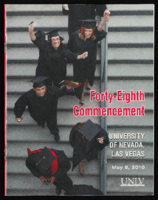Search the Special Collections and Archives Portal
Search Results

Charles Lee Hank III oral history interview: transcript
Date
Archival Collection
Description
Oral history interview with Charles Lee Hank III conducted by Claytee D. White and Barbara Tabach on April 10, 2019 for the Remembering 1 October Oral History Project.
Charles Lee Hank III describes his experience with police growing up in Chicago and the dichotomy he feels now as a police officer for the Las Vegas Metropolitan Police Department (LV Metro). Hank discusses the events of the October 1 shooting at the Route 91 Festival, the chaotic experience he and other officers experienced as they looked for the shooter in the Mandalay Bay, and the aftermath as a member of the Las Vegas community and as an officer of LV Metro.
Subjects discussed include: Las Vegas Strip Area Command.
Text

University of Nevada, Las Vegas (UNLV) 48th commencement program
Date
Archival Collection
Description
Commencement program from University of Nevada, Las Vegas Commencement Programs and Graduation Lists (UA-00115).
Text

Transcript of interview with Margaret Price by Joanne Goodwin, March 5, 1997
Date
Archival Collection
Description
When farm-girl-turned-waitress, Margaret "Maggie" Price, came to Las Vegas from Ohio in 1950 with her husband, Francis "Frank" Price, she had no idea what was in store for her in the hot desert oasis. Maggie's career spanned a period of historical transformation in Las Vegas when Downtown was becoming overshadowed by the development on the Las Vegas Strip. Vaudeville and striptease acts were still alive, but the arrival of big-named acts, such as the Rat Pack, Barbara Streisand, and the King himself, Elvis Presley, were just beginning to take the lead. Organized crime was still a prominent part of the culture and brothels still operated somewhat openly. The three decades Maggie and Frank worked in Las Vegas provided them with front-row seats for the birth, transformation, and occasional death of numerous casinos, including the Sahara, the Flamingo, the Sands, the Dunes, the Tropicana, and the International. Initially going to work as a waitress at the El Rancho Vegas, Maggie
Text

Transcript of interview with Danny Lee by Claytee White and Stefani Evans, May 23, 2016
Date
Archival Collection
Description
Folks who graduated Boulder City High School in 1953 and who began kindergarten there might remember being in kindergarten class with Clark D. "Danny" Lee. They would be excused for not remembering the towheaded Lee; after all, he was in Boulder City only for the first half of the year. They also would be excused for not remembering Lee because he never stayed in school once he arrived. Danny was the child whose mother faithfully brought him to class every day. And every day, as soon as his mother dropped him off, he took off and beat his mother home. Danny Lee was born in his grandparents’ house in North Las Vegas, grew up on 10 Bonneville Street, and (except for his first semester of kindergarten in Boulder City) attended Fifth Street Elementary School and Las Vegas High School, where he graduated in 1953 with Rex Bell. In 1960 he married fellow Las Vegas High grad and former Rhythmette, Dorothy Damron; they have raised four children. Here, Lee talks about the difficulties his father had finding work and supporting a family during the Great Depression-of living with relatives and moving from place to place in the small travel trailer as his father found work. He describes a hardscrabble Las Vegas, where he and other kids in in multiethnic groups found temporary work helping drovers in the stockyards or filling blocks of ice in the icehouse. He recalls working for Superior Tire during high school and for the Union Pacific Railroad in a variety of jobs after graduation and the U.S. Army-including a stint as a Union Pacific tour director. v Lee’s early kindergarten career seems an unlikely academic indicator for a man who would spend most of his adult life volunteering for and lobbying on behalf of Clark County public libraries and who the American Library Association would select as the 1990 Library Trustee of the Year. Ironically, Lee was asked to serve on the Clark County Library District board of directors to get rid of a troublesome library director. Instead, he became one of the director’s staunchest advocates. It is appropriate that Danny and his wife, Dorothy, are pictured here surrounded by library books. The native Las Vegan built a lifetime career as a State Farm Insurance salesman, but in this interview he focuses on his public library advocacy, his time as trustee for the Clark County Library District; the formation of the Las Vegas-Clark County Library District; the ambitious building program funded by $80 million in voter-approved statewide bonds; and the political wrangling in Carson City necessary to achieve these ends. Lee’s oral history complements that of his wife, Dorothy Lee, and of Charles Hunsberger, who was the “troublesome” library director at the time Lee was trustee. Lee made his living as an insurance salesman. Lee’s ability to sell a product-whether it be insurance or an $80 million bond issue-is the attribute that made Danny Lee so valuable as a trustee to the Las Vegas-Clark County Library District and consequently, to all Clark County residents who value public library services. However, his passion, and dedication, and unbowed determination earned him the Library Trustee of the Year award. As Lee closes the interview, he locks eyes with Dorothy and muses, "Let me tell you what I'm most proud of in all . . . I've been married to this lady for fifty six years now. . . . I've lived a very blessed life. Being born in my grandmother's house and having lived in little travel trailers, it's just good. It's worked. We're living like we've always wanted to live right now."
Text

Qiong Liu interview, June 8, 2016: transcript
Date
Archival Collection
Description
Interviewed by Claytee White. Dr. Liu is the City Manager for the City of North Las Vegas. Discusses housing, diversifying the economy, Apex, Faraday and negotiations to secure that business for North LV.
Text

Transcript of interview with Melanie Greenberg by Barbara Tabach, June 14, 2016
Date
Archival Collection
Description
When Melanie Greenberg was a young girl in her hometown of Kansas City, Missouri, she thinks it is likely that she crossed paths with her future husband at Hebrew School. However, it would be years later in college when they officially met – and fell in love and married in 1970. By 1976, Missouri was in the rearview mirror and career opportunities for her husband Gene Greenberg would lead them to Las Vegas. With their 18-month-old daughter Sari, they drove into Las Vegas for the first time, down Boulder Highway to Flamingo Road. Gene’s employer had arranged for a room at the Flamingo Hotel. As she explains, there many have been a better route, but it brought them to town and they stayed, raised their family, and became fixtures in the community since that moment. Among their first goals was finding a synagogue. Melanie’s magical touch has been felt in many places within the Las Vegas Jewish community: an active member of Temple Beth Sholom, the Jewish Federation’s Young Leadership and Women’s programs, organizer of Hebrew High, coordinator of L’Dor V’Dor activities for seniors, and Executive Director of Hillel from 1996 – 2003.
Text

Transcript of interview with Alice Thiriot Waite by Carole Terry and Donna Andress, October 19, 2011
Date
Archival Collection
Description
The memories and recollections of Alice Thiriot Ballard Waite provide a most interesting look at both at the Junior League of Las Vegas in the 1970s and the early days of Las Vegas. Alice recalls her childhood and young adult years after she arrived in Las Vegas at the age of five, giving the reader a rare picture of Las Vegas in the 1950s and 1960s. She was most active in the volunteer community of Las Vegas and served as Junior League President in 1964-5. Her reminiscences about the events and activities during the years while she was a Junior League member are an invaluable insight into its history. The exhibits she is sharing are an important documentation of those years after the Service League became the Junior League. She herself was a forerunner of today's Active members because she was a single, working mother while serving as the first "professional" President of the League.
Text

Transcript of interview with Peter Perazzo by Claytee White, July 22, 2016
Date
Archival Collection
Description
Peter Perazzo, a land surveyor born and raised in Las Vegas, talks about his family, his Native American ancestry, and how construction and land surveying have changed over the years. Peter’s father, Frederick Perazzo, moved temporarily to Las Vegas from Reno in the 1940s to find employment. He worked as a draftsman, and later an architect. He designed public building and residential buildings around the valley as well as at Area 51 (Atomic Test Site). His temporary move became permanent in 1953 with the purchase of a family home in Northwest Las Vegas, across from Twin Lakes. Peter’s early life was spent playing in clover in the family’s yard and enjoying his four grandmothers. Peter began his land surveying career working for the Bureau of Land Management (BLM) in 1985. He describes how he became hooked on the profession and describes surveying terms like monuments, townships, and “the dumb end of the tape”. Later Peter worked for the Nevada Department of Transportation, where he wa
Text

Transcript of interview with Gwen Walker by Claytee White, July 15, 2014
Date
Archival Collection
Description
Gwendolyn K. Walker arrived in North Las Vegas in 1962 from Houston, Texas, as a five-year-old with her parents, two brothers, and her cousins. The Walker family at first moved to a rented house on D Street, and Gwen attended Kit Carson Elementary School for first grade. Her mother enrolled in nursing school, so she sent Gwen back to Delhi, Louisiana, to be raised by her grandmother. In Delhi Gwen picked cotton with her aunt while she was in the second grade. Gwen returned to North Las Vegas to live with her mother and complete elementary school at Jo Mackey before matriculating to J. D. Smith Elementary School for junior high school and then to Clark High School. Later she attended UNLV. Gwen and her mother joined Saint James Catholic Church at H Street and Washington Avenue, but after she returned from Delhi she joined Second Baptist Church, where she became close with a cohort of friends that remained strong even as she experienced racism and bullying and love for the first time.
Text

Transcript of interview with Charles W. Hunsberger by Stefani Evans and Claytee White, July 27, 2016
Date
Archival Collection
Description
It seems counterintuitive that a man who was raised a Mennonite, spoke Pennsylvania Dutch before he spoke English, and was destined to quit school after eighth grade to work on the family farm would grow up to become one of the most progressive and visionary library directors in the United States. His participation in the Building Las Vegas project results from his being responsible for building twenty libraries in Clark County during his 1971–1994 tenure as director of the Las Vegas-Clark County Library District. One of his first controversies was to insist on going to high school after his father demanded he quit. After graduating high school he went to Nigeria on behalf of his church, serving there for five years. Upon returning to the U.S., he found work at the Fort Wayne Library, albeit he was limited by how far he could advance because of his limited education. After attaining his library degree Indiana University at Bloomington he served as director at the Columbia City Library
Text
